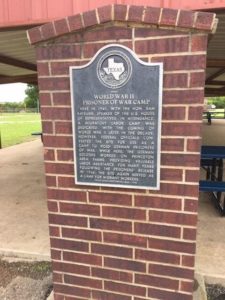Note: I wrote this item for KETR-FM based at Texas A&M-Commerce. I want to share it on High Plains Blogger.
Who knew that German soldiers who fought against our guys during World War II would play a part in building a North Texas community?
Not me, certainly. At least until recently.
I followed some signs the other day in Princeton pointing me toward a World War II POW camp. About three left turns later, I found myself pulling into a city park that is still under development, with an estimated completion date of July 2019.
All I found was a Texas Historical Commission marker noting the existence of the POW camp that actually functioned as such from February 1945 until the end of World War II in August 1945.
Prior to taking prisoners of war from European battlefields, the site is described as a “migrant” camp established in 1941 with the help of the great Sam Rayburn, the speaker of the U.S. House of Representatives who hailed from nearby Bonham in Fannin County.
It fascinates me to realize that German prisoners of war – men who had been captured trying to kill Americans – actually were put to work on North Texas farms and in Princeton itself. According to the historical marker inscription: “While here, the German soldiers worked on Princeton area farms, providing valuable labor assistance. For many years following the prisoners’ release in 1946, the site again served as a camp for migrant workers.”
There’s a certain poetic irony in the work the Nazi soldiers did on our area farms. Why? The North Texas agriculture community’s ranks of able-bodied men had been depleted because those sons of farming and ranching families answered the call to fight in defense of their way of life against, oh, Germans, Italians and Japanese.
That’s not where the poet aspect of this historic episode ends, however.
Again, according to the Historical Commission plaque: “Not only did the prisoners work in the field, but they also did stonemasonry work in downtown Princeton. Others helped construct a park in Princeton built in memory of the men who served in the armed forces during WWII and a shrine to perpetuate the memory of those who lost their lives in the war.”
Ponder that for a moment. I do not know whether the German POWs knew in the moment that they were would build a park memorializing Americans who were sent to Europe to save the world from the tyrants who sent them to war against us.
I am going to presume that they had to know something was afoot when they went to work in Princeton.
Can it possibly get any more poetic than that?
